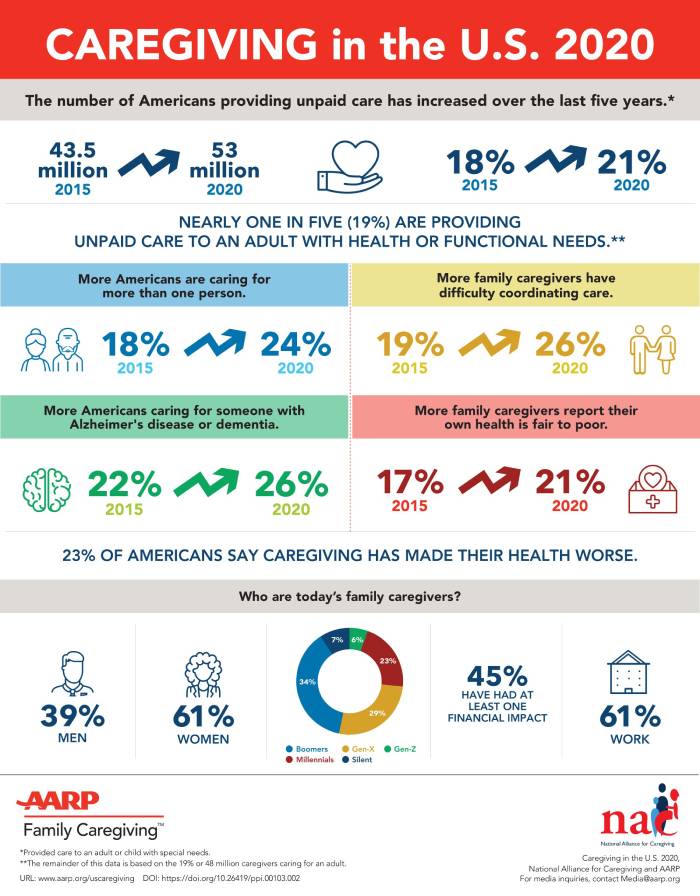Family Caregiver Role Growing in Queens
According to the National Alliance for Caregiving (NAC) and AARP, family caregiving jumped significantly from 2015 to 2020 and it does not seem like the trend is turning around anytime soon. Now, over 41 million Americans are caring for loved ones. That’s a 16.8% jump in just 5 years. With so many more family members having to care for their elderly loved ones, it is time to take caregiver stress even more seriously.
Prevalence of Caregiving for an Adult Age 50+, 2020 and 2015
|
2020 Prevalence |
# US Adults who are Caregivers |
2015 Prevalence |
# US Adults who are Caregivers |
|
| Caregiver Recipients Aged 50+ | 16.8% ↑ | 41.3 million | 14.3% | 34.2 million |
↓↑ Significantly higher or lower than expected
Driven to Care
We all know that admirable and highly capable caregiver who feels personally driven by their work and believes they can handle the stress. They are typically very compassionate individuals who live to help others. These heroic caregivers feel that their empathy for others is enough to push them to do nearly anything. They subconsciously think of themselves as invincible.
However, neglecting yourself will eventually take a toll on both your physical and emotional health. It’s estimated that one-third of caregivers will put others first, even while struggling with personal health problems.
Caregivers Have Their Limits
Caregivers experience stress just as frequently as anyone else. Unfortunately, they often dismiss it assuming it is something that comes with the job. Many caregivers who experience caregiver stress just push on despite emotional and physical fatigue. They often put their patients before themselves, allowing their stress to grow and manifest in poor health. However, denial is not sustainable. While the selflessness of caregivers is commendable, their lack of self-care could lead to severe consequences.
Caregiver Stress Has Medical Consequences
In fact, caregiver stress can cause demonstrable medical problems. Those who take on the responsibility of caring for aging or ailing individuals need to stay healthy themselves. Round-the-clock care can lead to running on lack of sleep and lack of food – both well-known catalysts of a decline in health. Moreover, very often caregivers do not receive the amount of healthcare monitoring they themselves deliver. The bottom line is 23% of Americans feel that caregiving has made their health worse.
Caregiver Stress can Lead to Self-Destructive Behavior
Stressed caregivers are more likely to develop problems with substance abuse and alcoholism. Mounting pressures, avoidance, and relying on the help of pills are all ways which could lead a good caregiver down a path of self-destruction. These are health issues in their own right, but they can also lead to additional health problems.
Caregivers don’t ignore the problems their patients’ experience, so why should they ignore their own? They must seek treatment for the real problems that have presented themselves while trying to address the underlying problem of caregiver stress.
Caregiver Suicides
It’s a little known fact that that caregivers of patients with dementia are more likely to commit suicide than workers in other fields. Caregivers are ill-equipped to diagnose or manage their own stress and unprepared to combat escalating mental health issues.
Working all alone in the field with their charge leads to caregivers having to deal with their own feeling of isolation. Theis means that often fall in their own depression apart from the all too come elderly depression. They need a support system no less than the elderly patient they are caring for.
Patients Can Suffer As a Result of Caregiver Stress
Those who experience caregiver stress must get help for if it is left to fester, it could have an effect on their caregiving. In extreme cases, if left unchecked, it could lead to elder abuse and neglect. The job is fraught with emotional and physical realities that are often both heartbreaking and demanding.
As many as 40 percent of caregivers dementia patients suffer from depression. Though the problem is widespread, it is rarely discussed. These sad realities naturally lead to stress often culminating in depression. This occupational hazard is an issue that needs to be addressed.
When caregivers deny their own health needs, it isn’t just negative for them. Research from UC Berkeley found, patients suffering from dementia will have a shorter life expectancy if their caregivers experience persistent untreated anxiety or depression.
Working Through Caregiver Stress
There are many resources available for caregiver stress, including groups that provide social support and therapists who specialize in helping people cope with caregiver stress. Caregivers need to realize that there isn’t only emotional support available to them, but real and practical helping hands.
Home health aides are available anywhere from 4 hours to a live-in basis to provide caregivers with some relief. Caregivers can use this time to take care of their own needs or just get some much needed rest and relaxation. They can work with caregivers in order to provide the best possible standards of care for patients while totally customizing it to the specific needs of their charge. Being a caregiver is difficult, and getting more support can make all the difference in the world.
An Additional David York Agency Service
David York Home Healthcare can refer you to an agency to help you work through the caregiver stress and feelings of depression you may be experiencing. We can also recommend services that target depression in the elderly, should your loved one be experiencing mental health problems. Please contact us for more information on caregiver stress and related issues.
David York Agency Home Healthcare Can Help Seniors in Queens
At David York Agency, we understand the many challenges and risks faced by the aging and elderly and are dedicated to providing care to support them through all of those ups and down. At David York Home Healthcare Agency, extraordinary service is what sets us apart from other companies in Queens that provide in home healthcare services.
DYA we could provide direction as to how to manage the total care of your senior loved one. Whatever your care needs, we are there for you, always striving to exceed your expectations. For more information about David York Agency’s qualified, compassionate caregivers, contact us at (718) 376-7755. A free phone consultation can help you determine what services would meet your needs. We aim to provide you and your loved one with the assistance they need. If you’d like to hear more from us, please like us on Facebook or follow us on Twitter or LinkedIn.
For more helpful tips and information, check out our blog or contact us today.








